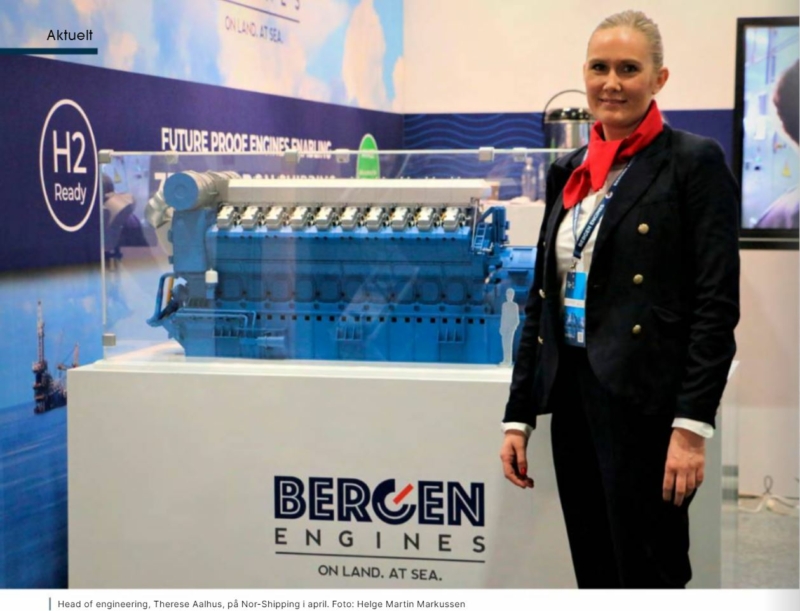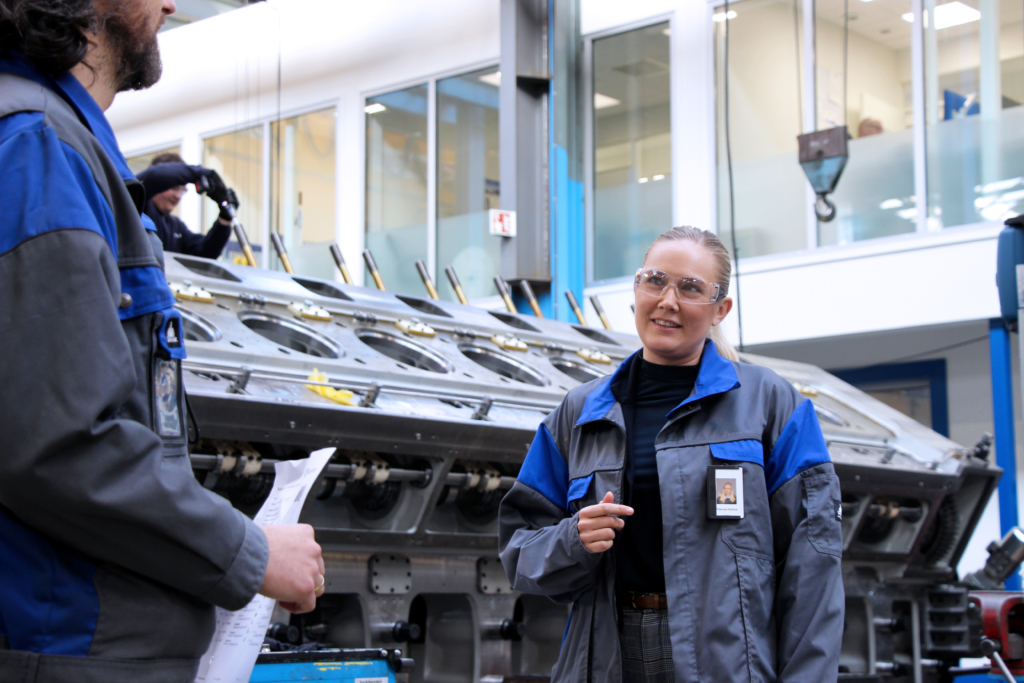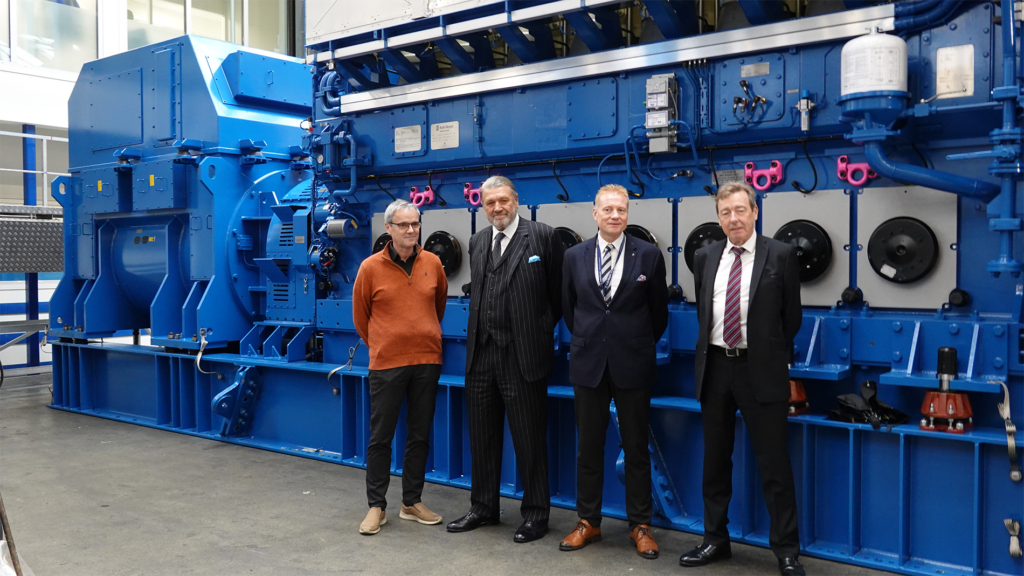
| Archive News, At Sea., Our stories, Recent News
Bergen Engines AS participated at the Nor-Shipping event in Lillestrøm in April. During an interview with Maritime magazine Skipsrevyen*, Bergen Engines’ Head of Engineering, Therese Aalhus explained to journalist Helge Martin Markussen that “regardless of what will become the fuel of the future, a Bergen engine will be able to run on it“.
Bergen Engines has partnered with several parties to invest roughly 40 million NOK (4 MEUR) in a project called AMAZE.
AMAZE stands for ‘The Ammonia Zero Emissions project’ and was started in January this year with a time frame of three years. The aim is to develop technology for a fuel-flexible internal combustion engine with carbon-free ammonia as the primary fuel. It is a collaboration between Bergen Engines, Equinor, SINTEF Energy Research, SINTEF Ocean, NTNU, and RISE Fire Research.
“Exactly what will become the solution everyone will end up with in the future is unknown. Hence, we need to start somewhere, find out what we have most faith in and move towards that direction. Fast enough but also slow enough so we do not put all our eggs into one basket,” said Therese Aalhus.
She explained the AMAZE project is not product development, where the aim would have been to have a commercial engine ready for sale at the end of the project. It will however give information on the necessary systems able to run on ammonia.
“It will be a period after this, depending on when we commit to develop the product, before we have a commercial solution ready for sale. A lot can happen during the next three years with regards to which direction things are going.”
One of the challenges partners are facing, is the injection technology. That is why they are starting with the most challenging task first; to get ammonia to burn and to give the result they are aiming for. The overall goal is to get a zero-emission engine.
“First, we need to figure out exactly how the mix will be in the future. To make something burn sufficiently, to be able to run 100 per cent emission free, is the big challenge. If it had been commercially available today, we could have just done it,” Aalhus said.
Regulations needed
Ammonia is one of the most handled substances in shipping. Each year, huge amounts of the very toxic and extremely corrosive fluid is transported across oceans. However, there are currently no regulations to use this as an energy carrier. This must be developed, Aalhus underlined.
“We need regulations both with regards to using it in combustion, how toxic it is, and safety. We have to learn more about how we can utilise ammonia in such a way, that we get the same effect as we do with today’s energy carriers.”
Ammonia, compared with hydrogen, takes up less space in terms of volume. That is why many, including Bergen Engines, believes this to be the most relevant alternative for the deep-sea fleet. On the other hand, hydrogen is an alternative for ships operating closer to shore and in shorter distances, so one could end up with several products for different segments.
Simultaneously as Bergen Engines are looking to ammonia, the company is also conducting a hydrogen project. So far, the company has successfully run an ordinary gas engine on a blend with up to 15 percent hydrogen. This has gone very well, according to Aalhus.
“It is not always the case that theory and practise is a match, but it has been in this case. I would not say the results are surprisingly good; rather better than expected.”
A third energy carrier is biofuel, which probably has the shortest way to the goal.
“Island Offshore’s vessel, the Island Crusader, has installed engines that are running on biofuel, which has been operating just fine,” Aalhus said.
“Shipping is known as a conservative industry, but it is also an industry that is pushing us in a direction for new things to happen. That is when we wish we had all the answers. We know there can be challenges in choosing materials both if they want to run on hydrogen or ammonia, and that is what we seek to find answers for in the projects we are conducting now. But we do not have these answers today,” she added.
Missing infrastructure
Another thing that is necessary, is the infrastructure. Even if the engine manufacturers were ready today with engines and gensets that could be fuelled by the future fuels, it would not be enough fuel to obtain. This is both the case for ammonia, hydrogen, and biofuels.
“There are many plans, and we need to pay attention to what is happening and what is being realised. We aim to be ready with our engines when the infrastructure is in place. It needs to be enough fuel available, but it is equally important that the fuel is green. We still have a way forward until this is available in all ports.
While people in Norway are talking a lot and loudly about ammonia and hydrogen, our neighbour in the south, Denmark, is all about methanol. Bergen Engines has in no way written this off as a potential fuel for the future.
“Methanol is easier to implement as a fuel. It does not require as much product development and it takes up less space. Another benefit is that it can be produced synthetically. On the other hand, producing methanol also require big amounts of energy, especially if it is to be produced in a green way,” Aalhus commented.
Regardless of what will end up as the future fuel, it will be expensive. Also compared with today’s extraordinary high fuel process.
“To build a ship is a long-term investment, and we believe that LNG is good transition fuel for the future. That is why we are saying that the engine you buy today, can also be used in the future without having to replace the complete engine set,” Aalhus said and added:
“2030 is not far away and there are many ambiguous targets that are pushing us forward. But the market must drive this forward, and also be willing to help paying for it. At the same time, I also believe the government has to contribute,” she concluded.
*Translated with permission from Norwegian maritime magazine, Skipsrevyen,

Bergen Engines’ Head of Engineering, Therese Aalhus said that regardless of what will become the fuel of the future, it will be able to power an engine from them.

